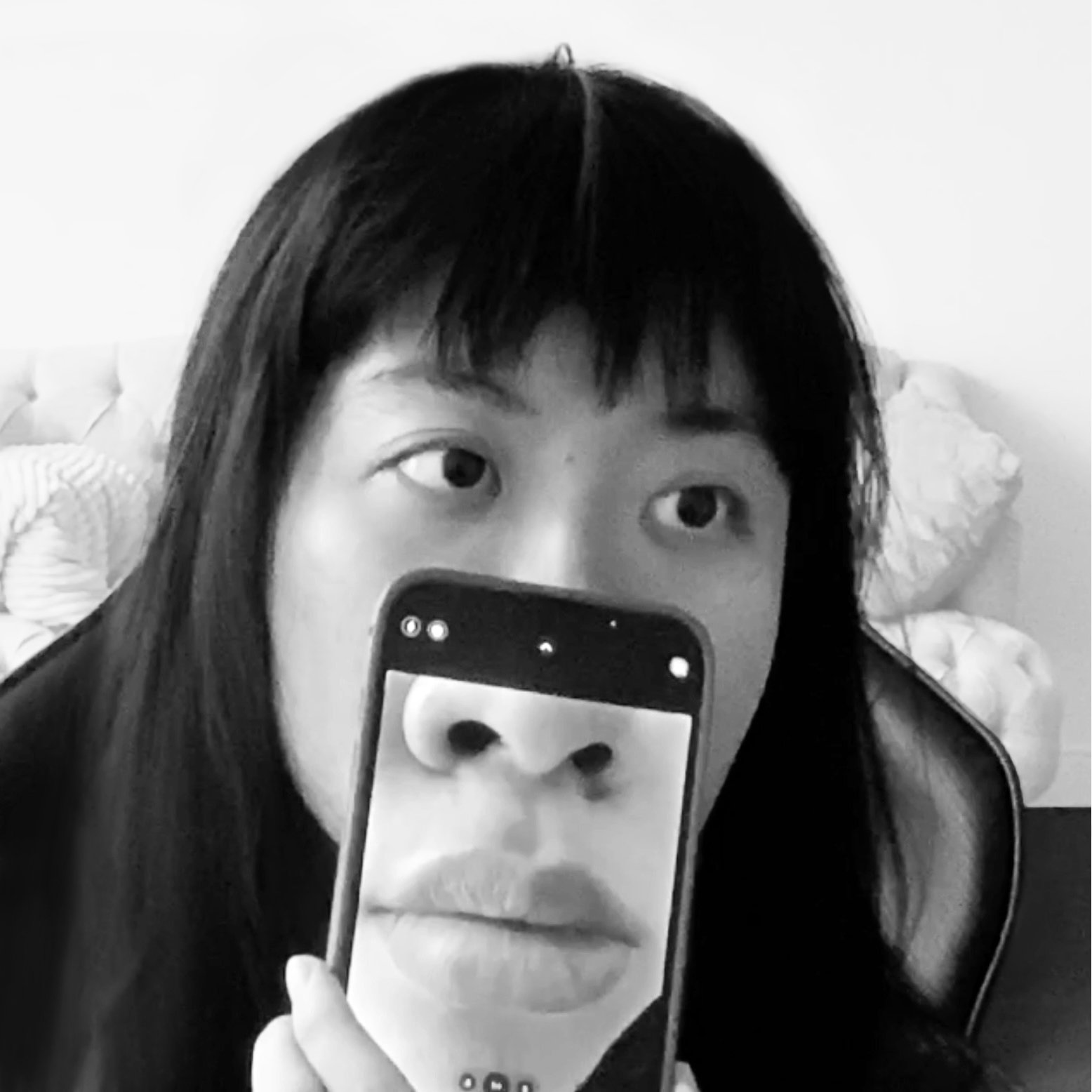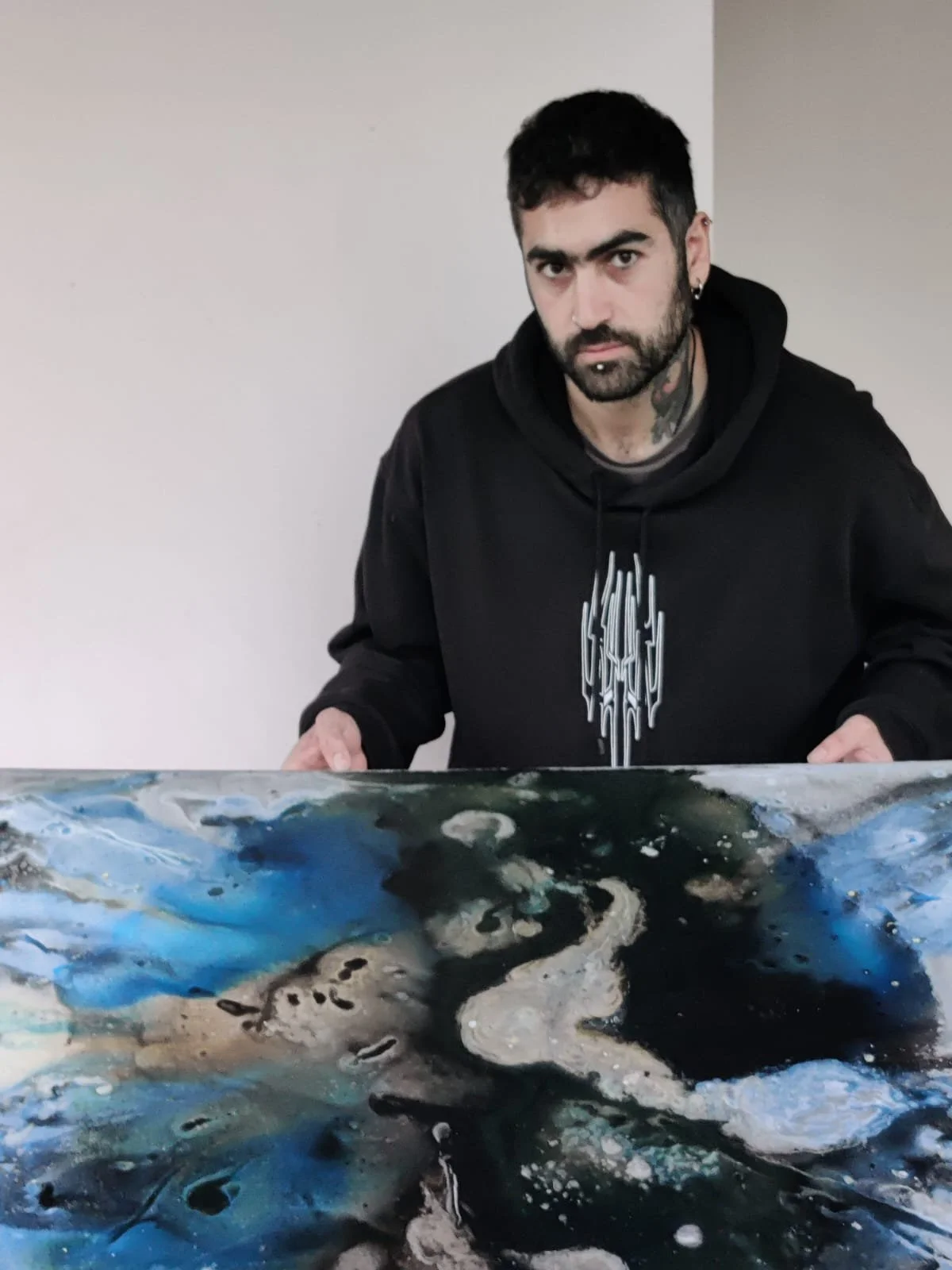INTERVIEW | Ziyi Zhang
10 Questions with Ziyi Zhang
Al-Tiba9 Art Magazine ISSUE15 | Featured Artist
Ziyi Zhang, an interdisciplinary artist in Chicago, holds an MFA in Painting and Drawing from SAIC and a BFA from Washington University in St.Louis. Currently teaching at SAIC, her work encompasses painting, installation, and interactive media, delving into unconventional explorations of human conditions.
Ziyi Zhang - Portrait
Family Photo Album | Project Statement
Ziyi Zhang’s Family Photo Album (FPA) (2023) is an interactive, browser-based work of art that explores the artist’s “bestie,” a Chinese international student who studies art in America. Bestie eventually abandons her art and leaves behind a body of work revealing her collective family memories. The result is a stunning exploration of notions of truth, cultural and generational disconnect, and the relationship between social class and art.
Family Photo Album, interactive media, 2023 © Ziyi Zhang
AL-TIBA9 ART MAGAZINE ORIGINAL ISSUE15
INTERVIEW
How did you get involved with art, and what influenced you to follow this path?
I attended public elementary and middle schools in Beijing. Back then, I didn't have much exposure to art, but I had a strong passion for drawing. I loved it and felt pretty good at it compared to other kids. Of course, when I say "good," I mean drawing accurately. People around me tended to judge art by how realistic it looked, so they thought I had talent.
Looking back, I realize that my passion for drawing was partially based on my passion for my own talent. If it weren't for the praise from people around me, my enthusiasm might have waned.
It wasn't until my junior year in college that my awareness of contemporary art started aligning with reality, and that's when I began to be exposed to it. However, by then, I was already in my third year, and it was a one-way road with no turning back.
So yeah, when I chose fine arts, I didn't know much about contemporary art. I went with what I knew and believed in, my own perception of art and my talent.
Frog Eraser, Oil and mixed media, writing, robotic technology, 23.5x22x2 in, 2023 © Ziyi Zhang
How did you develop into the artist you are today? What training or experiences help you shape your practice and persona?
I attended WashU for my BFA, and it was a fantastic program. It was there that I had my very first exposure to the real contemporary art scene. I was incredibly passionate and stubborn about creating art my way. I did everything in my power to bring my vision to life, disregarding assignments, grading, space limitations, cost, or time. When I had something in mind, I found a way to make it happen.
Every artwork became a labor of love for me. While others might have churned out the whole series in the time it took me to finish one piece, I poured all my knowledge and desires into each creation.
I'm still pretty stubborn, but I'm learning to embrace constraints and broaden my perspective. It's all part of the journey toward growth and refinement as an artist.
Your work encompasses painting, installation, and interactive media. What is your preferred medium of choice? And what draws you to explore such diverse forms of artistic expression?
I don't really have a preferred medium due to my constantly shifting interests, although currently, I'm mostly working digitally. Medium isn't my primary concern. Instead, I typically design the project first and then choose the medium that best brings my vision to life, regardless of what it may be. I’m a visual person. Other than concepts/storytelling, aesthetics play a significant role in my decision-making process. I tend to find the medium that creates a cohesive and impactful visual experience.
Dissolving Forms, Oil and mixed media, writing, robotic technology, 23.5x28x2 in, 2024 © Ziyi Zhang
Pencil Lead, Oil and mixed media, writing, robotic technology, 24.5x28x2 in, 2023 © Ziyi Zhang
What are your preferred themes? Do you tend to gravitate around certain themes or concepts, or are you open to addressing different ideas?
Different ideas come to me depending on my state of well-being and what's happening in my life at the time. I do find myself gravitating towards themes of suffering and negative emotions. However, my art isn't just about the emotions themselves; it's about transforming them into something I enjoy. For me, creating art from negativity is a way to reclaim power and "get back at life." If obstacles are unavoidable, then I’d like to manipulate them and take advantage of them, turning them around in some sense.
Let's talk about your project, Family Photo Album. How did you come up with this concept? And what influenced you to experiment with this theme?
There were two main factors that influenced the conceptualization of this project. Firstly, after entering grad school, I began to feel like I was losing my passion for art, which was quite painful. Transitioning from being an art student to a practicing artist was a challenging learning curve for me. I found myself comparing my progress to that of my friends, many of whom pursued careers in tech or finance. It felt like I was just going through the motions without making any meaningful impact on the world. I started to feel invisible and, for the first time, uncertain about my future as an artist.
Around the same time, I became increasingly interested in my family history. With the passing of the elderly members of my family, their stories were lost forever. I realized that I knew very little about the lives they lived in a world that seemed distant to me. They never talked about it, and it seemed like no one else in the family cared to inquire. I recognized that if I didn't start asking questions and documenting these memories, they would fade away.
These two aspects merged to inspire the creation of the family photo album project. The result was an exploration of truth, cultural and generational disconnect, and the intricate interplay between these factors and art.
Family Photo Album, interactive media, 2023 © Ziyi Zhang
Family Photo Album, interactive media, 2023 © Ziyi Zhang
How do you incorporate personal narratives and experiences into your artistic practice, and what significance do they hold in your work?
For me, my artistic practice is inherently personal. Art, in my view, can only be derived from life, and everything I make is drawn from my own experiences and the world around me. Each piece I make is an extension of my state of being.
Incorporating personal narratives and experiences into my work allows me to infuse authenticity and depth into my art. It adds layers of meaning and resonance that connect with viewers on a more profound level.
As an artist working with different mediums, how important are new technologies and innovations for your work? And how do you keep up to date with the latest developments?
While I haven’t used “new technologies” as a theme in my work, I do work with new media and frequently utilize technology. For instance, I'm currently collaborating with tech mediation labs on a series of paintings that integrate painterly techniques with robotic technology.
I don’t actively seek out the latest technological developments but rather focus on finding the most effective ways to realize my design vision. Oftentimes, this leads me to incorporate technology into my projects. Consequently, I find myself constantly learning and experimenting with new skills and technologies.
Nap (collaboration with Zhi Ding), Oil and mixed media, robotic technology, 12x12x2 in, 2024 © Ziyi Zhang
What do you think of the changes we are witnessing in the art world, in particular about AI and its usage in the art process?
Personally, I appreciate these changes because they bring about more tools for creatives. Currently, I don't use visual AI in my art-making process because it hasn't reached the level of quality I require for my work. While the image and video-generating methods available can certainly be useful for artists with specific stylistic choices, they don't quite meet the standards or needs of my visual language, which tends towards pixel-perfect, ultra-realistic abstraction. However, I'm open to utilizing AI in the future once it reaches a level of sophistication that aligns with my style.
Lastly, what is one piece of advice you would give to your students or to any emerging artist?
Art as a profession can easily dilute the initial excitement. Never forget your initial passion. Don't take for granted those mornings when all you had to do was immerse yourself in your art – whether it was writing, painting, recording, or creating. It's a surreal and fortunate thing to be able to pursue your passion as a career.
Yes, the art world can be incredibly challenging. Its unique dynamics can lead to moments of darkness and doubt that few in more traditional careers will ever experience. During these tough times, reflect on that initial excitement and love for what you do.
However, it's also essential to remember that life is paramount, and happiness should always come first. I don't entirely agree with Kant and Schopenhauer's disregard for happiness in favor of duty or purpose. So, if there comes a point where pursuing art no longer brings you joy, if you find yourself in constant suffering, it's time to quit. Life will always be greater than art, and your well-being should always be a priority.


























